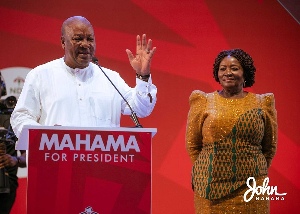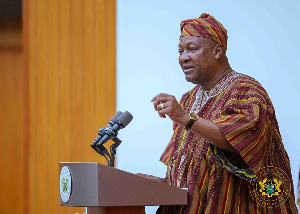What is the difference between Executive Instrument ( E.I. 63) introduced by the Nana Addo administration and the Postal Packets and Telecommunication messages Bill (Spy Bill) that the Mahama administration attempted to pass?
Is the spirit of the E.I. 63 and the Spy bill any different?
Why did civil society groups and human rights defenders protest against the passage of the Spy bill but silent on E.I. 63?
Is it that we trust the Nana Addo administration when it comes to access to citizens phone records as against the Mahama Administration?
Mahama’s Spy Bill
So in February 2016, the John Dramani Mahama administration forwarded to Parliament the Spy bill. It was fiercely rejected by both the opposition party-NPP and civil society groups and human rights campaigners.
The purpose of the Spy bill was to grant security agencies access to listen in (access to a persons telephone conversation) and/or read telephone calls and messages of individuals. The main purpose was to protect national security and fight against crimes.
Nana Addo Dankwa Akufo-Addo, then the Presidential candidate of the NPP presenting what the party termed the real state of the nation address on February 29, 2016, said, “Essentially this bill gives the state unfettered discretionary access to the private correspondence of individuals. It poses a potentially a major threat to individual freedom of expression and privacy.”
OccupyGhana’s and CDD’s take
Occupy Ghana had this to say in part about the bill: “ The bill is an affront to our privacy as citizens. Some aspects of the bill make it a bit untrustworthy for others to implement, looking at the fact that the person who is supposed to be a national Security Coordinator who is a government appointee, could easily abuse this bill in favour of the ruling government that appointed him.
“We do not think there are enough regulatory acts of Parliament which can monitor the purpose this bill will serve said the Media Relations Officer for Occupy Ghana, Naana Sarpong Agyeman-Badu, said on February 24 2016.
CDD raised similar concerns earlier.
Martin Amidu’s say
Martin Amidu, now Special Prosecutor, in a letter dated February 29, 2016, to Parliament also said, “The bill had the tendency to interfere with fundamental human rights and freedoms of citizens.”
Ghana Bar Association
So did the Ghana Bar Association also kicked against the bill. The GBA called for the “withdrawal of provisions of clause 4(3) and (4) of the Bill, which allows the National Security Coordinator to orally authorize interceptions for 48 hours without any court order or warrant”.
Then E.I 63…
E.I. 63 came into force on March 23 2020:
It empowers the gov’t to access citizens telephone records, mobile money data, transaction and wallet details, merchant code, bank details. It has no expiry date.
Section 100 of the Electronic Communication Act, 2008 (Act 775) grants the President the power to order operators or providers of electronic communications networks or services requiring them to provide user information or otherwise in aid of law enforcement or national security.
I have read a lawyer is challenging the orders made by President Akufo-Addo to the telcos, on among other reasons, that the President did not declare State of Emergency, but rather activated The Imposition of Restrictions Law and, therefore, is not entitled to come under section 100.
It will be interesting to know what the courts will say in fact.
But it’s good we discuss this as a people. Is there a difference between what Spy bill sought to do and what E.I. 63 seeks to do?
Is it now appropriate because of COVID-19?
Maybe, this is not attracting much public debate because of the mode of the world, and perhaps the country. Many are concerned about their immediate safety and what government can do to protect it. And perhaps it is also a good timing for a public policy so contentious as a spy law.
Just may be, the country may return to this debate, about just how much spying they want their government to do on them in the interest of public safety and security.
Opinions of Thursday, 9 April 2020
Columnist: Sammy Darko















